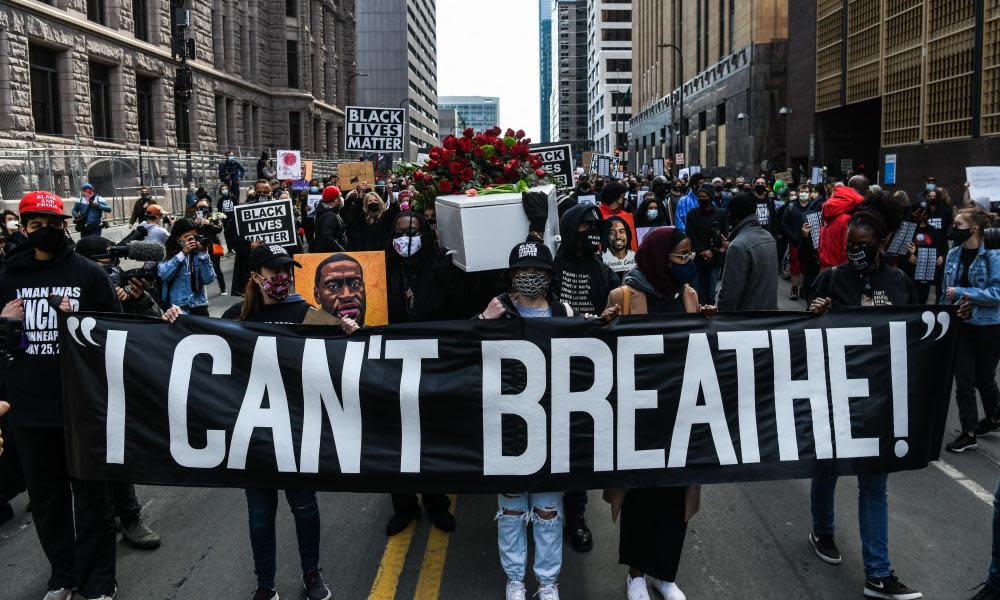George Floyd killing: defense rests case after Derek Chauvin declines to testify

- Oops!Something went wrong.Please try again later.
- Oops!Something went wrong.Please try again later.
Derek Chauvin declined to testify in his murder trial over the killing of George Floyd as the defence wrapped up its case after just two days of testimony.
Chauvin invoked his fifth amendment right against self-incrimination as he sacrificed the chance to explain to the jury why he kept his knee on Floyd’s neck for more than nine minutes and for his lawyers to paint a more sympathetic picture of the police officer. But he also avoided a minute interrogation of his actions and thinking by the prosecution’s cross-examination.
Both sides will make closing arguments on Monday and the case will then go to the jury.
Chauvin, 45, has denied charges of second- and third-degree murder, and manslaughter, over Floyd’s death last May which prompted mass protests for racial justice across the US and other parts of the world.
The defence rested its case after a series of witnesses challenged prosecution claims that Chauvin and two other police officers were responsible for Floyd’s death by pinning him to the ground and instead blamed the 46-year-old Black man’s heart conditions and drug use.
On Wednesday, the defence’s leading medical expert, Dr David Fowler, also introduced the idea that carbon monoxide from vehicle exhaust contributed to Floyd’s death.
And on Thursday, the judge allowed the prosecution to recall one of its key witnesses, Dr Martin Tobin, to rebut Fowler’s testimony.
Tobin challenged Fowler’s assertion that the level of carboxyhemoglobin in Floyd’s blood – carbon monoxide attached to protein which displaces oxygen – was between 10% and 18% which would have contributed to heart failure.
“I believe it is not reliable,” said Tobin.
Tobin said tests showed Floyd’s blood oxygen saturation was 98%, leaving just 2% for “everything else”.
Last week, Tobin, a pulmonologist, told the trial that Chauvin and the other officers caused Floyd’s death by cutting his oxygen supply which caused brain damage and his heart to stop. Tobin discounted defence attempts to shift the cause of death to Floyd’s heart disease and drug use, saying that without the police officers on top of him he would not have died and that “a healthy person subjected to what Mr Floyd was subjected to would have died”.
None of the charges require the prosecution to prove that Chauvin intentionally killed Floyd.
To convict Chauvin of second degree murder, which carries a sentence of up to 40 years in prison, the jury must find that the accused policeman caused Floyd’s death “while committing or attempting to commit a felony offence”, meaning assault in this case.
Conviction on the lesser charge of third-degree murder, which carries a maximum sentence of 25 years, requires the jury to find Chauvin committed an “act eminently dangerous to others … without regard for human life”.
The judge originally blocked the third-degree murder charge but the prosecution appealed and won its reinstatement because it increases the likelihood of a conviction if the jury is unable to agree that Chauvin was committing a crime by kneeling on Floyd’s neck instead of only showing disregard for his safety.
Chauvin also faces a charge of second-degree manslaughter which requires prosecutors only to prove he took “an unreasonable risk” that endangered Floyd’s life. It carries a sentence of up to 10 years in prison.
The judge told the jury that it would be sequestered once it begins its deliberations. Advising them on how much to pack, he said “plan for long and hope for short”.
Three other police officers involved in Floyd’s death are scheduled to be tried together later this year on charges of aiding and abetting murder and manslaughter.

